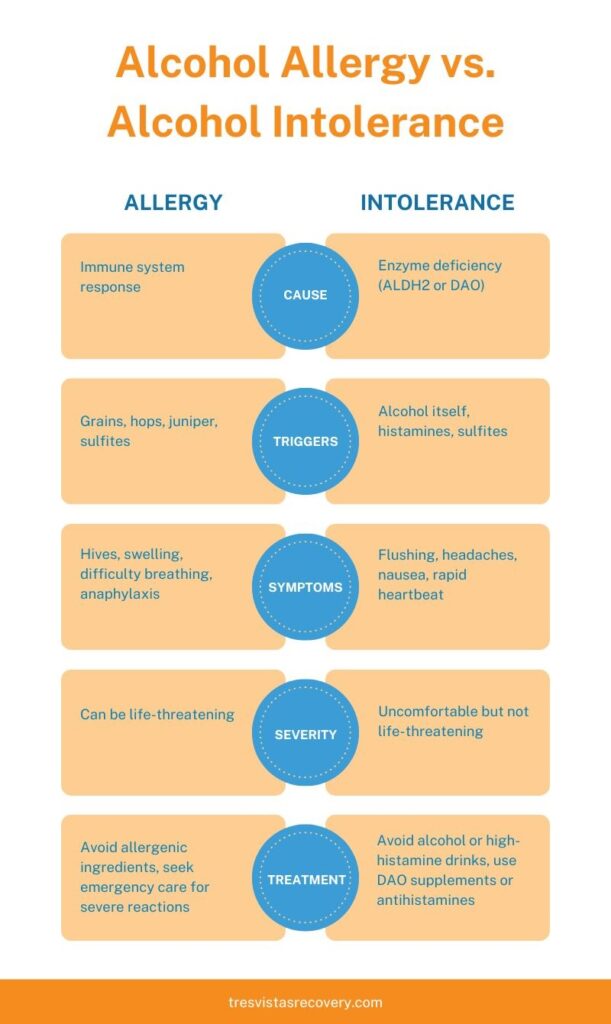Milk, eggs, nuts, and strawberries are among the most common food allergens worldwide, triggering reactions that range from mild itchiness to severe anaphylactic shock. Similarly, alcoholic beverages—especially red wine, white wine, and beer—can cause adverse reactions due to their high histamine content and fermentation process. For some individuals, these reactions aren’t simply due to alcohol itself but rather a histamine intolerance that affects the body’s ability to metabolize histamines effectively.
A 2012 study by the Orange County Healthcare Agency highlighted the widespread impact of alcohol misuse across all demographics, underscoring the importance of understanding how various substances interact with the body. One overlooked but significant factor in alcohol-related reactions is histamine intolerance, which can cause digestive issues, skin reactions, and more severe symptoms beyond simple alcohol sensitivity.
Are You Experiencing a Histamine Reaction to Alcohol?
Have you ever noticed an itchy sensation, flushing, or congestion after drinking wine, beer, or other alcoholic beverages? That warm, red flush or sudden skin irritation might not just be an alcohol flush reaction—it could be a sign of histamine intolerance.
Histamine intolerance occurs when the body does not produce enough diamine oxidase (DAO), the enzyme responsible for breaking down histamines. Without sufficient DAO activity, histamines from alcoholic beverages build up in the system, leading to symptoms such as:
- Facial flushing (red, warm face and neck)
- Itchy skin or hives after drinking
- Stuffy or runny nose
- Headaches or migraines
- Nausea, bloating, or digestive discomfort
If you’ve experienced these symptoms, your body may struggle to metabolize histamines properly, making it challenging to tolerate alcohol without adverse side effects.
At Tres Vistas Recovery, we specialize in helping individuals navigate alcohol-related health concerns, including histamine intolerance and alcohol sensitivity. Understanding how histamines interact with your body can help you make informed decisions about alcohol consumption and overall well-being.
Continue reading to explore how histamine levels in your favorite drinks could be affecting your health, and learn what steps you can take to minimize symptoms and manage histamine intolerance effectively.
Alcohol Intolerance vs. Allergy
Understanding the distinction between alcohol allergies and alcohol intolerances is crucial, although these terms are often used interchangeably. Typically, an allergy is more severe than an intolerance, yet both can lead to uncomfortable symptoms.
When someone exhibits an alcohol allergy, it’s usually in response to specific ingredients in the beverage, such as grains or acetaldehyde—a prevalent byproduct of alcohol metabolism. The allergens might include wheat, grains, hops, juniper, or potatoes. The immune system perceives these substances as threats, initiating an allergic reaction as it would against viruses or bacteria. This reaction aims to expel the substance from the body, occasionally leading to life-threatening scenarios, such as anaphylaxis, where the throat swells, potentially obstructing breathing.
Contrastingly, alcohol intolerance is often due to enzymatic issues, notably with alcohol dehydrogenase, a crucial enzyme for alcohol breakdown. Another significant factor might be a deficiency in ALDH2 (aldehyde dehydrogenase 2), a genetic condition impacting alcohol metabolism. This intolerance can manifest through various symptoms after consuming alcohol, indicating difficulties in processing histamines or sulfites found in certain alcoholic beverages, such as red wine and white wine, known for their high histamine content due to the fermentation process.
True alcohol allergy is rare, especially when compared to allergies like dairy or peanuts. If you experience discomfort digesting alcohol or symptoms post-consumption, it’s more probable you’re dealing with alcohol intolerance. This condition might stem from an inability to adequately metabolize alcohol, potentially due to insufficient levels of diamine oxidase (DAO) or issues related to histamine intolerance, which complicates the body’s response to fermented drinks rich in histamines.

Alcohol Intolerance – What is it?
Alcohol, despite being a widely consumed alcoholic beverage, presents a challenge for the body to metabolize efficiently. To your kidneys and liver, alcohol is essentially a toxin, compounded by its richness in sugars. The body’s reaction to alcohol and its byproducts often manifests as an adverse reaction in some individuals, hinting at what we define as alcohol intolerance.
A key player in the body’s attempt to process and eliminate alcohol is an enzyme named Aldehyde dehydrogenase, commonly referred to as the ALDH2 enzyme. This enzyme is crucial in the alcohol metabolism process, converting alcohol into acetic acid, a vinegar-like substance, through a simplified but essential biochemical reaction.
However, not everyone possesses the same efficiency of the ALDH2 enzyme due to genetic variations. This genetic diversity can significantly reduce the enzyme’s effectiveness, often serving as the root cause of alcohol intolerance. Unlike allergic reactions to specific ingredients in alcoholic drinks, alcohol intolerance fundamentally stems from the body’s inefficiency in transforming alcohol into a substance that’s easier for the body to process.
Identifying whether you carry the genetic variant linked to this intolerance can be tricky without genetic testing. Yet, recognizing the symptoms following alcohol consumption can provide clues. Symptoms such as digestive issues, skin reactions, or a heightened sensitivity to drinks with high histamine content, like red wine and white wine, may indicate an intolerance. These beverages undergo a fermentation process that can increase their histamine levels, exacerbating intolerance symptoms in sensitive individuals.
Observing your body’s response after drinking alcoholic beverages can offer insight into potential histamine intolerance or a deficit in the ALDH2 enzyme, negating the need for expensive genetic tests. Paying attention to how your body metabolizes alcohol, especially if experiencing symptoms like flushing, hives, or digestive issues, is key to understanding your tolerance levels and managing your intake accordingly.
Symptoms of ALDH2 Deficiency-based Alcohol Intolerance
Alcohol intolerance, particularly stemming from an ALDH2 deficiency, can manifest in distinct and uncomfortable symptoms shortly after consuming alcoholic beverages. Key indicators include:
- Red, hot face: Often the first sign of alcohol intolerance, this flushing is a direct response to histamine levels in alcohol and an inability to metabolize them effectively.
- Headache: Not just a common aftermath of drinking but a specific reaction that can be exacerbated by high histamine content in certain wines and beers.
- Nausea: Beyond the typical overindulgence, this can indicate a sensitivity to fermentation byproducts in alcohol.
- Vomiting: A more severe reaction, indicating a significant intolerance to components in alcoholic drinks, possibly related to histamine intolerance.
- Rapid heartbeat: Another symptom that signals your body’s struggle with alcohol metabolism, potentially linked to histamine and sulfite sensitivities.
Noticing these symptoms after enjoying a modest quantity of alcohol—well below the threshold that would lead to nausea from overindulgence—suggests an underlying intolerance. This condition highlights the body’s inefficiency in processing alcoholic beverages, particularly those with high levels of histamine or other compounds that challenge individuals with histamine intolerance or enzyme deficiencies.
If you experience these symptoms, it might not just be the usual consequences of drinking but signs of alcohol intolerance. Understanding your body’s signals and recognizing when reactions deviate from the norm can help manage your alcohol intake and avoid discomfort. At Tres Vistas Recovery, we emphasize the importance of listening to your body and seeking professional advice for managing symptoms related to alcohol intolerance.
Histamine Intolerance
Wines, beers, and other alcoholic beverages are known for their substantial histamine content. Histamines, natural compounds produced by the body, tend to accumulate in aged drinks or foods, such as wine and matured cheeses. While these elements add to the flavor and experience of consumption, they can pose challenges for those with histamine intolerance.
Most people can process histamines without issue, but for some, these compounds can lead to significant discomfort. The root of this problem often lies in insufficient production of diamine oxidase (DAO), the enzyme responsible for breaking down histamines found in alcoholic beverages and fermented foods. Without enough DAO, individuals may experience reactions akin to allergic responses or the well-known alcohol flush reaction.
Symptoms of histamine-induced alcohol intolerance may include:
- Red, hot face: A common and immediate sign of histamine intolerance.
- Itchy skin: Manifesting as an uncomfortable sensation across the body.
- Congestion: Nasal blockage or stuffiness as a response to histamines.
- Breathing difficulties: In more severe cases, indicating a significant intolerance.
- Diarrhea: Resulting from the digestive system’s reaction to excess histamines.
- Stomach discomfort: Including cramps and pain due to histamine presence.
For those suspecting a histamine-based intolerance reaction, antihistamines can offer relief by helping the body manage the histamines already present. However, it’s crucial to choose non-drowsy antihistamines if you plan to continue activities, and it’s advisable to cease alcohol consumption for the day to prevent exacerbating symptoms.
It’s worth noting that while Benadryl (diphenhydramine) is a commonly used antihistamine for various allergic reactions, its sedative effects make it unsuitable for use with alcohol, as it can significantly increase drowsiness and impair cognitive functions.
Awareness of how histamines in alcohol affect your body can guide you in making informed decisions about alcohol consumption, especially if you have experienced adverse reactions in the past. If you frequently encounter these symptoms, consulting with a healthcare professional for personalized advice and potential dietary adjustments is recommended.
Intolerance Of Sulfites
Sulfites serve as a crucial component in the preservation of many alcoholic beverages, including beers and wines. These additives are employed by manufacturers to prevent further fermentation by natural yeast, ensuring the beverage maintains its intended flavor and freshness over an extended period.
While sulfites are generally well-tolerated by the majority of individuals, they can pose significant challenges for those with specific sensitivities or underlying health conditions. Particularly, individuals with asthma or respiratory issues may find sulfites to be problematic, as exposure can trigger reactions closely resembling asthma attacks, including coughing and difficulty breathing. Red wine stands out for its pronounced sulfite content alongside its celebrated richness and complexity. It is often through the consumption of red wine that many individuals discover a sensitivity to sulfites, experiencing adverse reactions that hint at a sulfite-based alcohol intolerance.
For those sensitive to this preservative, the symptoms can be quite pronounced, leading to an immediate need for caution with certain alcoholic beverages. Understanding your body’s reactions to sulfites is crucial, as it can guide you in selecting drinks that are more compatible with your health needs, potentially avoiding those with high sulfite concentrations.
Awareness of sulfite sensitivity is important, not just for personal comfort, but also for maintaining respiratory health, especially in individuals predisposed to asthma or other respiratory conditions. If you suspect you have a sulfite sensitivity, it may be beneficial to consult with a healthcare provider for advice on managing your intake and choosing sulfite-reduced or sulfite-free options when enjoying alcoholic beverages. This knowledge empowers individuals to make informed decisions about alcohol consumption, ensuring a safer and more enjoyable experience for those with sulfite sensitivities.
How To Treat Alcohol Intolerance
While there is no cure-all solution for alcohol intolerance, the most effective approach to managing this condition is to minimize or entirely avoid alcohol consumption. For some individuals, steering clear of specific alcoholic drinks like wine or beer may be sufficient to prevent unpleasant reactions. However, for others, a complete abstention from alcohol may be necessary to ensure health and well-being.
At Tres Vistas Recovery in San Juan Capistrano, we understand the challenges faced by those dealing with alcohol intolerance, especially when compounded by substance abuse issues. Our facility offers a spectrum of treatment options tailored to meet individual needs, including a Partial Hospitalization Program (PHP) and an Intensive Outpatient Program (IOP). These programs are designed to provide structured support while allowing patients to maintain their daily life commitments.
For individuals seeking assistance with alcohol abuse, our medication-assisted treatment offers a strategic approach to detoxify the body from alcohol-related toxins and alleviate the symptoms of alcohol intolerance. This method is particularly effective in easing the withdrawal process, making the journey towards recovery a more manageable experience.
Understanding the complexity of substance abuse and alcohol intolerance, our outpatient rehab is committed to delivering extensive care and support. We accept a variety of insurance plans, ensuring that effective treatment is accessible to those in need. Our dedicated team of healthcare professionals is here to guide you or your loved one through a comprehensive substance abuse treatment plan, tailored to address individual challenges and promote long-term recovery.
If you’re navigating the difficulties of alcohol intolerance or seeking support for alcohol abuse, Tres Vistas Recovery is here to provide the care and assistance necessary for a healthier, alcohol-free lifestyle.














